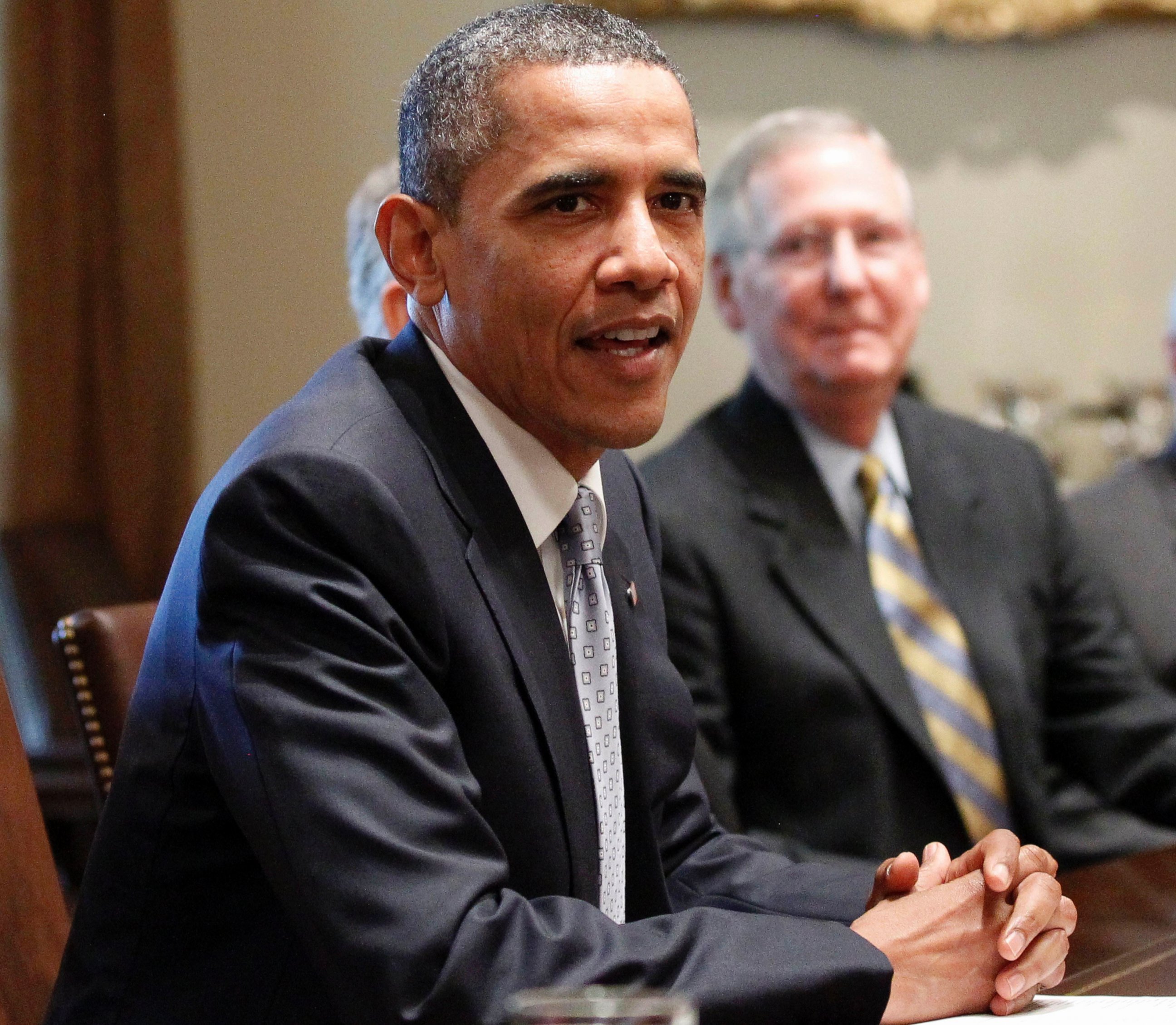Sen. Mitch McConnell's New Book Slams 'Professor Obama' and Jabs at Fellow Lawmakers
What's revealed in the Senate majority leader's book, "The Long Game: A Memoir.”

— -- Senate Majority Leader Mitch McConnell, R-Kentucky, says he's tired of lectures from "Professor Obama" and he views each meeting with the president as a waste of time filled with monologues about why he's right and Republicans are wrong.
Meanwhile, McConnell says he likes his Senate counterpart, Minority Leader Harry Reid, D-Nevada, but argues the Democratic leader is "rhetorically challenged" and has a "Dr. Jekyll and Mr. Hyde personality." He also contends Reid did great damage to the Senate when he ran the chamber.
The Senate majority leader delivers these critiques and others in his new book "The Long Game: A Memoir" that hits the shelves on May 31. ABC News obtained a copy this week.
McConnell’s publisher is pitching the book as a "candid, behind-the-scenes memoir of a man famous for his discretion."
The book does deliver some candor -- mostly at the expense of Democrats -- but McConnell is also careful not to stir up too much political controversy for himself. The book concludes following his 2014 re-election victory and doesn’t include any commentary on the 2016 presidential election or its leading candidates: Donald Trump and Hillary Clinton.
He does have some biting comments about a senator who bashes his GOP colleagues for not being conservative enough and too timid to challenge Obama. That may sound like Sen. Ted Cruz, R-Texas, but in this case McConnell is directing his ire at former Sen. Jim DeMint, R-South Carolina, who now runs the conservative Heritage Foundation. McConnell argues DeMint "took the practice of shooting inside the tent to another level."
Overall, McConnell lays out his life in politics and uses the memoir to make the case for the importance of the Senate at a time when Congress’ popularity with the public is at historically low levels.
Here are some highlights from the book:
Dissecting 'Professor Obama'
McConnell takes a negative view of Obama's leadership approach, likening the commander-in-chief to the "kid in your class who exerts a hell of a lot of effort making sure everyone thinks he’s the smartest one in the room."
Often asked what the president is "really like," McConnell recounts that he always repeats the same line: "He's no different in private than in public." To McConnell, that means: "He talks down to people, whether in a meeting among colleagues in the White House or addressing the nation."
To illustrate his view, he points to a June 2011 meeting about budget issues.

"Nothing came out of that meeting or the many subsequent meetings between the White House and members of Congress. Why? Because they went exactly like most meetings with Barack Obama go. Almost without exception, President Obama begins serious policy discussions by explaining why everyone else is wrong," McConnell writes.
"After he assigns straw men to your views, he enthusiastically attempts to knock them down with a theatrically earnest re-litigation of what you’ve missed about his brilliance. The topic at hand rarely matters -- what to do on the debt limit or what to get for lunch.”
Harry Reid’s Personality
McConnell often dismisses the idea that he and Reid don’t get along, saying in his book that he likes Reid and "reporters may want to believe there’s a personal animus at play, but there isn’t."
But despite his protestations, McConnell has some less-than-generous comments about his Democratic rival.
"Harry is rhetorically challenged. If a scalpel will work, he picks a meat-ax," McConnell writes.
He goes on to say that Reid has a "Dr. Jekyll and Mr. Hyde personality." In person, McConnell describes Reid as "thoughtful, friendly, and funny" but as soon as the cameras turn on or he’s offered a microphone, "he becomes bombastic and unreasonable, spouting things that are both nasty and often untrue, forcing him to then later apologize."
After Reid invoked the so-called "nuclear option" on presidential appointments, McConnell recalls a pep talk from his wife, former Labor Secretary Elaine Chao, on how he could fix what the Washington power couple felt was Reid's broken Senate.
"It was utterly depressing to watch what Harry Reid had done to the Senate," McConnell writes. "The day he’d invoked the nuclear option, Elaine called and asked if I wanted to meet for dinner at La Loma. She knew how upset I would be, and when I arrived at the restaurant, she was there waiting for me at a table in the back, my margarita ready."
"How are you feeling?" she asked as I sat down.
"This place is a mess," I said.
Elaine reached across the table to take my hand. ‘Well look at it this way,’ she said, with a hint of a smile. ‘There’s nothing tougher than following somebody who did a great job, and nothing that makes it possible for success better than following somebody who made a mess of things.’”

Nancy Pelosi's Rehearsed Lines
While McConnell doesn't write much in the book about former Speaker and current House Minority Leader Nancy Pelosi, D-California, she is another Democratic leader that he hits with criticism.
McConnell complains about a December 2012 budget meeting at the White House between congressional leaders and Obama where he laments "Professor Obama" wasted their time with yet another lecture. He then moves on to give his take on Pelosi’s role in the many meetings they’ve attended since they both ascended to leadership roles.
"Her role in these meetings (as with most meetings) was to come with one talking point and repeat it again and again. On this day, the talking point she’d been handed must have said 'Don’t forget the children.' She must have uttered this phrase a dozen times in her attempts to get us to change our thinking on the death tax," he wrote.

Taking Aim at a Former Senate Colleague
McConnell is also heavily critical of DeMint, who left the Senate in 2013 to run the Heritage Foundation. During his time in Congress, DeMint was viewed as a voice of the tea party movement and was often critical of his colleagues for not being conservative enough. In many ways, his style was a precursor to how Cruz has conducted his Senate career.
While McConnell doesn’t address Cruz, with whom he has had a contentious relationship at times, the Kentucky Republican makes his views on DeMint clear.
"But while there have always been a few senators willing to throw members of their own party under the bus for some press recognition, Senator Jim DeMint of South Carolina took the practice of shooting inside the tent to another level," McConnell wrote.
He said DeMint was a pretty good senator his first four years in office.
"But then DeMint or his staff, I could never figure out which, became something of an innovator in Republican-on-Republican violence. He figured out how to capitalize on criticizing his colleagues not just with the press, but the American people as well. Of course, Jim wouldn’t dream of actually confronting a colleague. He was almost submissive in our weekly lunches, preferring to eat in silence rather than inject his point of view. But outside the doors of the Mansfield Room, where we ate, it was another story," McConnell writes.
"Almost daily he would complain to the press about the insufficiently conservative views of his colleagues. In all the years I worked with Jim, I can’t remember him ever initiating a confrontational conversation with them. He rarely if ever attempted to persuade a single senator of anything. But he wouldn’t blink at the opportunity to bad mouth them behind their backs to the press."
The Importance of the Senate
An overarching theme of McConnell's book is how important the Senate is and how it has been damaged in recent years by a variety of factors.
"We’ve lost our sense for the value of slow and steady deliberation, for the type of work that depends more on patient diplomacy than on power plays and media manipulation. Under Democratic leader Harry Reid, the Senate Chamber frequently became little more than a Democratic campaign studio. Many of the bills that Reid allowed for consideration were bills his party did not intend to pass," he writes.
He adds that a "big problem with the Senate today is the way many politicians on both sides of the aisle style themselves as saviors," which he said is not only "self-serving nonsense" but "it’s exploitative of the voters."
"And it reflects a fundamentally un-American view of how our political institutions were meant to function," McConnell writes.
"I don’t know what some of my more disgruntled colleagues thought the Senate would be like, but perfection is not in its mission statement," he adds. "This means that if you’re a purist, being a U.S. senator will be utterly exasperating. It also means that if you’re open to something less than perfection, being a U.S. senator can be deeply rewarding."




